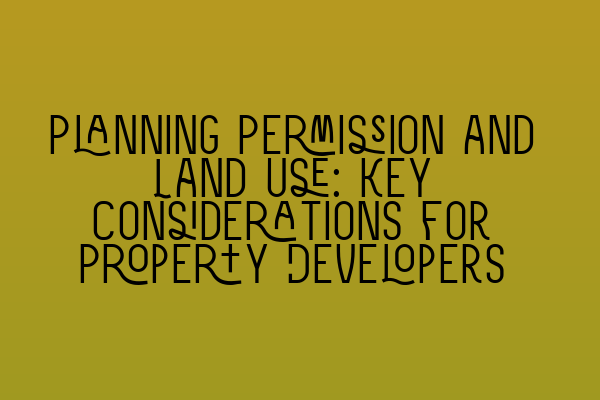Planning Permission and Land Use: Key Considerations for Property Developers
As a property developer, one of the crucial aspects you need to navigate is obtaining planning permission and ensuring appropriate land use. This is a fundamental step in the development process that can significantly impact the success and profitability of your project. Understanding the key considerations and guidelines regarding planning permission and land use is essential to avoid costly delays and legal issues. In this article, we will explore the crucial factors that property developers should keep in mind when dealing with planning permission and land use.
The Importance of Planning Permission
Planning permission is necessary for most new developments, renovations, or changes in land use. It involves seeking approval from the local planning authority to proceed with your intended project. Planning permission ensures that the development aligns with the local planning policies and regulations, safeguarding the overall interests of the community and the environment.
1) Research and Pre-Application Consultation: Before submitting a planning application, it is crucial to conduct thorough research to understand the local planning policies, development plans, and constraints that may affect your project. Engaging in pre-application consultations with the relevant planning authorities can provide valuable insights and guidance regarding your proposal. By seeking professional advice and conducting a feasibility study, you can assess the viability of your development plans.
2) Submission of Planning Application: Once you have gathered the necessary information and feasibility study, you can proceed with the submission of your planning application. It is vital to ensure that your application is comprehensive and includes all the required documents and drawings. Providing clear and detailed information about your development plans can expedite the application process and minimize the possibility of objections or delays.
3) Engaging with the Local Community: Engaging with the local community and addressing any concerns they may have can significantly impact the outcome of your planning application. Consultation with stakeholders, including nearby residents, businesses, and community groups, can help create a positive relationship and demonstrate your commitment to developing a project that benefits the community. Addressing concerns and incorporating community feedback into your plans can enhance the chances of obtaining planning permission.
4) Compliance with Planning Conditions: Once planning permission is granted, it is essential to comply with any conditions imposed by the planning authority. These conditions may relate to design, materials, landscaping, or other specific requirements. Complying with these conditions is crucial to ensure that your development proceeds smoothly and avoids any potential legal disputes or enforcement action.
Land Use Considerations
Apart from planning permission, property developers must also consider the appropriate land use for their projects. Determining the best use of land involves evaluating factors such as local planning policies, market demand, infrastructure, environmental impact, and sustainability. Here are some key considerations to keep in mind:
1) Local Planning Policies: Familiarize yourself with the local planning policies and development plans that govern the area in which you intend to develop. These policies outline the land use, permitted activities, and guidelines regarding design and development. Adhering to these policies is crucial to avoid planning permission challenges and ensure the long-term success of your project.
2) Market Demand and Feasibility: Conduct a thorough market analysis to assess the demand and feasibility of your proposed land use. Understanding the demographic trends, economic conditions, and market dynamics can help you determine the suitability of your project. Consider engaging with property consultants who can provide valuable insights and data to inform your decision-making process.
3) Infrastructure and Facilities: Assessing the availability and adequacy of infrastructure and facilities in the area is essential when determining land use. Adequate transport links, utilities, and access to amenities are crucial factors that can impact the attractiveness and viability of your development. Evaluating the infrastructure provisions can help you identify any potential limitations or opportunities for improvement.
4) Environmental Impact and Sustainability: With increasing focus on sustainability and environmental conservation, property developers need to consider the ecological impact of their projects. Conducting an environmental impact assessment and incorporating sustainable design features can enhance the desirability and marketability of your development. It is essential to comply with any regulations or requirements related to environmental impact and sustainability.
Conclusion
Obtaining planning permission and ensuring appropriate land use are critical considerations for property developers. By conducting thorough research, engaging with stakeholders, complying with planning conditions, and evaluating land use factors, developers can navigate the complexities associated with planning permission and land use. Remember that professional advice and guidance from property law and land law experts can provide invaluable support in ensuring a successful and compliant development project.
Related Articles:
SQE 1 Practice Exam Questions
SQE 1 Practice Mocks FLK1 FLK2
SQE 2 Preparation Courses
SQE 1 Preparation Courses
SRA SQE Exam Dates
